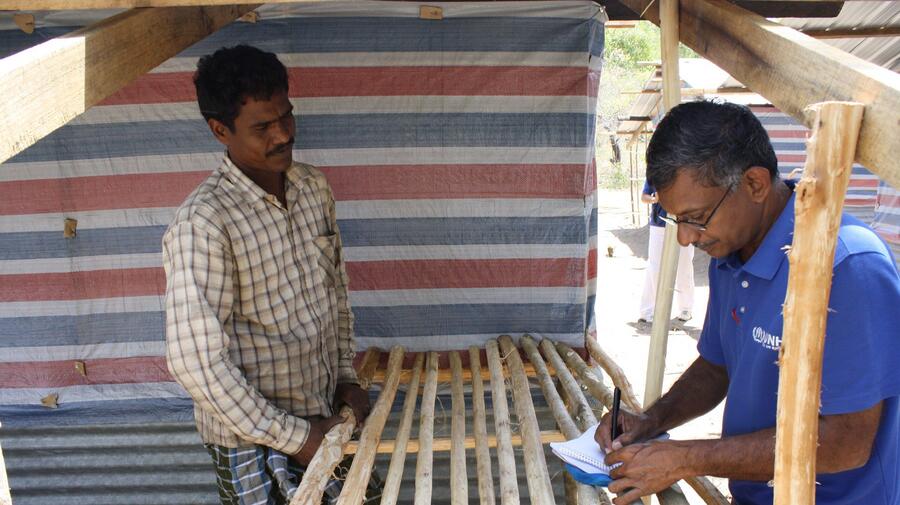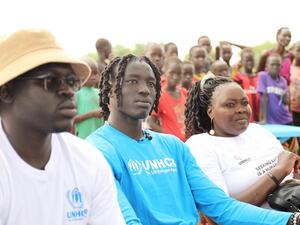Sri Lanka: Not home yet, but one step closer
Sri Lanka: Not home yet, but one step closer

Displaced carpenter Vijeya Kuamr chats with a UNHCR staffer inside the temporary shelter he has built for himself with UNHCR materials at an interim stop on his way home.
TRINCOMALEE, Sri Lanka, August 18 (UNHCR) - Forty-year-old Vijeya Kumar is giving the final touches to a newly erected shelter for his family in a village near this eastern town, using his professional carpentry skills and materials provided by the UN refugee agency.
One among thousands of Sri Lanka's internally displaced people, Kumar grabbed his family and fled to the neighbouring town of Batticaloa three years ago when Sri Lanka's 26-year civil war reached his village.
Now that the conflict is over, Kumar shares a dream in common with most of Sri Lanka's displaced: to be able to return home in safety. Luckier than many, Kumar is already one step closer to his dream.
He has recently relocated to a village just few miles away from his home in Sampoor. "I have to wait for few more months before I can return to my village, as it lies under an area declared a high security zone," says Kumar, father of a 17-year old son and an 11-year-old daughter.
More than 500,000 people were displaced during the long conflict, with around 280,000 fleeing just in the last few months of fighting in the north that ended the war in May.
The UN refugee agency, together with its partners, is supporting humanitarian initiatives to provide relief and assistance to displaced people in Sri Lanka during their displacement as well as when they are able to return home.
"UNHCR has been assisting people in Sri Lanka who have suffered from repetitive phases of displacement since 1987," said Elizabeth Tan, officer in charge of UNHCR operations in Colombo. "Their needs for shelter and relief supplies are looked after. People who are able to return are also supported with shelter kits and other relief items to make the transition process and resettling easier."
She added that "the best possible solution for a displaced person is to be able to return to his or her place of origin and home when conditions permit." During last two years, some 220,000 were able to return homes in eastern parts of Sri Lanka with UNHCR's help.
In the interim location where Kumar is working on his transitional shelter, 72 returnee families received material on land arranged by the community to support the returnees until their own lands are accessible. The others are carpenters, daily wage workers and farmers who were keen to return to their paddy fields.
"My son and I worked on this house and here it is ready to be occupied," says Kumar proudly, barely looking up from hammering nails into a wooden plank.
"Initially I was not sure about relocating to this place," he admits, "but now it feels good to be closer to your ancestral land. I know the community around this place and they know us. It feels good to be close your village, crop fields and be among your own community."
A returnee farmer, Thangarasa Rasakulasingham, 46, concedes that "moving from one location to another is difficult," but says "here we are almost home. We can access our paddy fields which are close to our present location. At Batticaloa we used to work for other people. Here at least it would be our land and our crop to cultivate and to harvest."
Kumar, for one, hopes his days on the run are over. "Once I am home," he says, "I will pray that there are no further displacements in my life or in the life of my fellow country men."
By Babar Baloch
in Trincomalee








